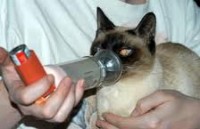Breathing a little easier
I haven’t had asthma since I got out of a smoking environment and divorced my husband in the series of unrelated events we call life. Of course I am certain that homeopathy also had a large bearing on my improved health in recent years.
Louise Hay says that asthma is ‘smother love’. Inability to breathe for one’s self. Feeling stifled. Suppressed crying. I can relate to all of the above and the opposite is ‘it is now safe for me to take charge of my own life, I am free’.
Well we can’t all get divorces to improve our health and in other cases taking that action, in itself, triggers its own set of health issues.
Our pets are also mostly stuck with us as well, unless they run away.
I have a colleague in Tasmania who practices Buteyko and is investigating ways to bring this into her veterinary practice.
Lung exercise whether through Buteyko or other techniques brings awareness, control and focus to the breath. I am sure that learning to meditate was another factor in my own cure.
Many people may also not be aware that our Australian Olympic swimming teams of the past few decades largely comprised asthmatics because swimming was considered to be a major therapy for asthma. I found that swimming exacerbated my asthma because I lived and swam in a cold climate, which is probably why the majority of our champion swimmers tended to hail from sunny Queensland.
All of this brings me to the point of this posting and that is to consider why cats get asthma. In another paradox, cats have been blamed for causing asthma in children for many years and many people have allergic reactions to cat fur. Horses also suffer from chronic obstructive pulmonary disease or asthma by another name. There are minor arguable differences in these terminologies but if the airways don’t work and you can’t breathe you care less for the name than getting oxygen.
So why do animals get asthma?
I would suggest that wild animals don’t get asthma but I suppose we will never know for sure. Domestic pets get asthma for the same reasons we do. They live in the same environments, mostly eat the same food (commercial processed grain based diets), often have immune system interventions and also have developing minds and emotions . They worry, get frightened and stressed and have a burden to carry should they be unable, or wish not, to escape.
Put simply, inflammation causes asthma and stress precipitates inflammation.
The stress can be physical such as certain smells, chemicals, pollens and allergens or mental/emotional like worry, fear and anxiety. Asthma is a spasm of the bronchial muscles that causes airways to narrow and this is an unconscious nervous and immune mediated response to the triggers I have mentioned. Severe pulmonary inflammatory cascades can be triggered to inhaled allergens like grain dusts and dust mite.
And there is the fact that some animals get asthma whilst others exposed to the same conditions do not. This comes down to identifying predisposition or, in homeopathic terms, constitution.
Diagnosis in cats is usually based on ruling out other causes of respiratory distress coupled with history of intermittent onset interspersed with periods of complete recovery.
Treatment depends on necessity, not all cats require medicating and the experience or choice of the prescribing veterinarian and owner. Invariably cortisone is the first choice of medicine in conventional clinics. I also used to prescribe bronchodilators and vaporisation until I discovered that identifying the deeper cause of asthma gave better results than treating the symptoms alone.
As with all cases of disease these days I would investigate the animal’s medical and family history, conduct a complete physical examination, advise on appropriate diets and make recommendations for optimizing environmental or managerial factors to reduce the chances of triggering asthma. And naturally I would prescribe some homeopathy!
Taking an holistic approach in itself is often a breath of fresh air.

